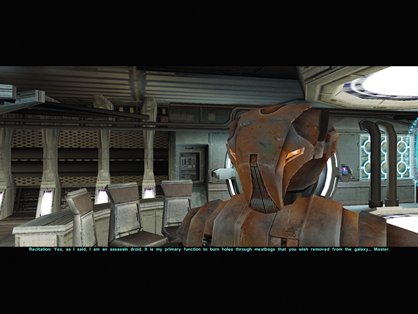The BioWare Technique
The devs talk about writing the company's RPG classics
Knights of the Old Republic was a hit for BioWare both critically and commercially, and for many one of the greatest Star Wars games ever created. But working within an established and well-known universe has a unique set of challenges compared to developing an original setting. “One of the advantages of using your own material is that you have a lot more freedom, you can kind of do anything you want,” explains Karpyshyn. “But with that comes a lot more responsibility too, because in establishing your world, you really have to try to make sure that the audience understands what you’re doing, and that they get what they’re looking for out of the experience. When you’re working with an existing setting, such as Star Wars... well, we were huge fans so we knew what the audience wanted. You take a much bigger risk with a new creation, but if it pays off, it’s very satisfying to know that you’ve made something entirely new that people respond to, which I think we’ve managed to do with both Jade Empire and Mass Effect.”

The plot of Knights of the Old Republic was, like all of BioWare’s stories, created internally by the game’s lead designer James Ohlsen, project director Casey Hudson and Karpyshyn. “We felt it was important that there was a revelation or twist to capture that Star Wars feel, the ‘I am your father’ thing, as it’s an integral part of the whole experience. We tried several different ideas - some worked, some didn’t. George Lucas’ role was more giving us approval and feedback on ideas, and LucasArts were really good to work with. They came to us because they liked the way we did things, and they were respectful enough to let us do our work rather than trying to impose something on us.”
KOTOR’s revelation - that moment in which your character’s insidious past is revealed - is a fantastic jaw-dropping moment, and the team believes that it was in the execution of the idea where the game really succeeded. Karpyshyn: “In simple terms it’s ‘Oh, you have amnesia,’ which has been done to death. It’s not so much a specific element of a story, but how you present it and all the little details that go with it. We knew from the very beginning that the twist was going to be a critical element of the story, so we spent a lot of time laying the foundations with things that kind of gave you clues to it, so that it fit, and didn’t look like we’d pulled it out of thin air and sprung it on you. There were clues that when you play it a second time you see much more clearly.”
KOTOR is a personal favourite of ours, so we take the opportunity to admit to the guys that the first time we completed it,we did so without unlocking the fantastic HK-47 robot. “I’m sure there would have been a time when Karpyshyn would’ve winced at that comment, but I’m sure he’s well past that now,” laughs Laidlaw. “Frankly that’s a minimum of two full months’ work on that character, but it’s really cool that you could play through the game and have a fundamentally different experience. We always think of it as a calculated risk whenever we’re designing stuff - are we comfortable with the player missing this? How much time did we spend on it and how cool is it that it’s possible to not see? A lot of the time it’s finding a balance, but for the guy that finds the hidden stuff, it’s so worthwhile and rewarding.”
Sign up to the GamesRadar+ Newsletter
Weekly digests, tales from the communities you love, and more


